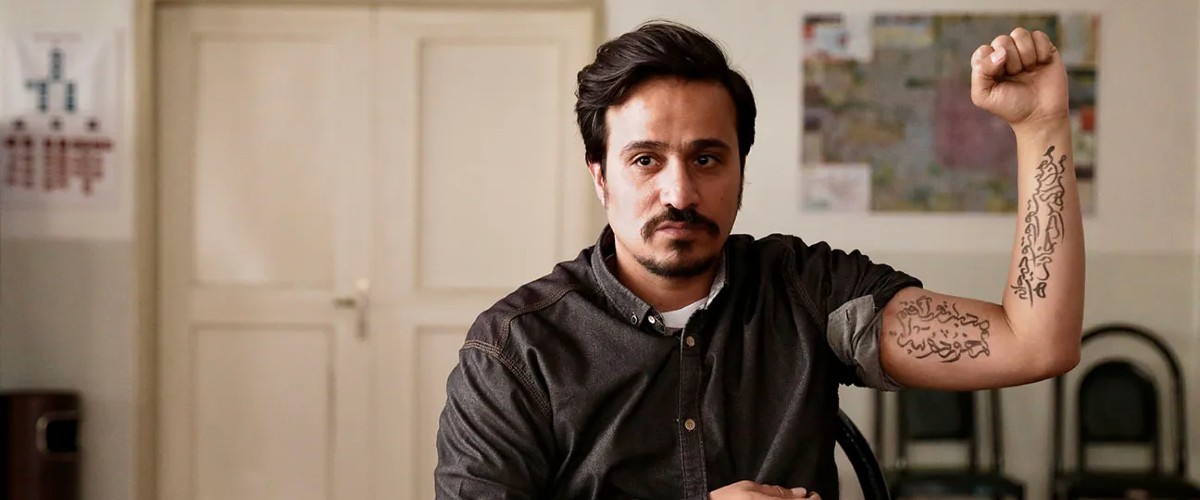“Terrestrial Verses,” one of the most brilliant and provocative films to emerge from Iran recently, has qualities that link it to both the modernist formal traditions of post-1979 Iranian cinema and the more recent trend of social and political asperities aimed at the authoritarian repressiveness of the Islamic Republic.
The film’s stylistic approach is both simple and daring. In each of its nine episodes, the camera is locked in place, staring, as it were, at a single person who is interrogated by an off-screen authority figure of one sort or another. Each scene plays through without edits, making it resemble a one-act play with both documentary and dramatic aspects.
“Terrestrial Verses” (the title comes from a work by the renowned poet and filmmaker Forugh Farrokhzad) was written and directed by filmmakers Alireza Khatami and Ali Asgari. Perhaps the best way to convey its unusual tone and manner is to describe its first two scenes.
In the first, the camera is directed at a dapper, well-dressed young man, who is telling an off-screen official that he and his wife want to name their new son David. The official is having none of it. Why David, he asks sternly. The young man says it’s the first name of his wife’s favorite author (we never learn the last name). But it’s Western, the official objects; the couple needs a good Iranian name for their boy. They go back and forth like this for a while, until the official asks the young man who his favorite author is.
“Gholam Hossein Saedi,” he replies. An Iranian audience would surely laugh at the young man’s choice of one of Iran’s most famous leftist writers, an enemy of the Islamic Republic, but also at the officer appearing never to have heard of Saedi, an immensely influential author whose story “The Cow” was the basis for the late Dariush Mehrjui’s film of the same title, which was widely credited with launching the Iranian New Wave in 1969. (Asghar Farhadi pays tribute to both the story and the movie in his “The Salesman.”)
The young man says he doesn’t like Gholam Hossien for his son’s name and the officer says why not just Hossein (the name of one of the preeminent figures in Shia Islam). The young man retorts that the name is Arabic, not Iranian.
While an Iranian audience would find a lot of droll comedy in this exchange, non-Iranians will get both the familiarity of the conflict (who has never had to struggle with the overbearing obstinacy of a petty bureaucrat?) and its undeniable foreignness: In what other country does the government presume to dictate what a couple can name its children?
I will not describe the ending of this episode except to note that, like the endings of some other episodes, it happens in an abrupt, unexpected way—a poetic technique I once observed in other post-revolutionary Iranian films, most notably those of Abbas Kiarostami.
Kiarostami’s influence (which Khatami and Asgari have acknowledged) is also evident in the second episode, the only one involving a child. Her name is Selena, she appears to be about eight years old and when we first see her, she’s standing in the aisle of a clothing store wearing a cute Mickey Mouse shirt and dancing to Western pop music she’s listening to on her headphones. While this mini-Beyonce surely could be found in virtually every country in the world, we soon see why this one could only exist in Iran.
Off-screen, two voices discuss a uniform Selena will be obliged to wear at an upcoming school event. The voice of the saleswoman is harsh and demanding, spelling out the rules the outfit must follow; the other voice, Selena’s mom, reluctantly concurs. The scene’s action begins when Selena is ordered to come try on an article of clothing. She returns to the frame wearing a long gray abaya, a garment designed to cover the shape of her body. Asked to come back again, she returns with a white hijab that covers her hair.
This process continues until the uniform is complete and all traces of Selena the individual have been erased; she now looks like an anonymous medieval Islamic automaton, junior size. Any non-orthodox-Muslim viewer is bound to view the little girl’s transformation with a mix of wonderment and horror. But don’t suppose that Selena’s mind and personality have been subdued by the sartorial imprisonment. When the fitting ends, she rapidly and rather contemptuously tears off the costume’s layers and resumes dancing.
Like other episodes in “Terrestrial Verses,” this one resonates with a piercing undertone of dissidence, one that situates the film at a particular moment in Iranian cinema. When Jafar Panahi’s “No Bears” played the New York Film Festival in 2022, Iran was being swept by protests—featuring the slogan “Women! Life! Freedom!”—that followed the death of a young woman arrested for wearing improper hijab. More so than previous protests, this one to me felt not just political but cultural. In my festival report, I offered the prediction that “The current moment will mark the ending of one era of Iranian filmmaking and the beginning of another … Going forward, we may see much more outright defiance on the part of filmmakers even as the government flails to tighten the screws …”
Even though it contains no violence and no mentions of politics or the current regime in Iran, “Terrestrial Verses” may be the most dramatic validation so far of that prediction. It is a scathing critique of the poisoned power relations in the Islamic Republic, relations that corrupt interactions by people at every level of Iranian society. And you can be sure the Iranian authorities understood it as just that. After the film enjoyed rave reviews and public acclaim around the world, Iran banned co-director Ali Asgari from traveling (Alireza Khatami was spared that punishment as a Canadian citizen) and confiscated some of the cast’s passports, laptops and phones.
Given the extraordinary restrictions Iran places on its filmmakers, it remains a wonder that films as intrepid and original as “Terrestrial Voices” somehow keep emerging from the country. Asgari and Khatami even cleverly acknowledge the absurd barriers they and their colleagues face. In one scene, a filmmaker faces an official who, in reviewing his script, keeps finding faults with its actions and ideas. The exasperated filmmaker responds by ripping out one handful of pages after another. The scene would be simply hilarious were it not so close to the awful truth.




















